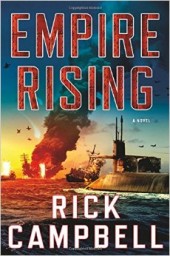 I have a sweet tooth for WWIII novels. While at the local Barnes & Noble last week, I spotted Rick Campbell’s Empire Rising. I had to buy it. It one of those paperbacks that is in between a mass market paperback and trade paperback and retails for $9.99.
I have a sweet tooth for WWIII novels. While at the local Barnes & Noble last week, I spotted Rick Campbell’s Empire Rising. I had to buy it. It one of those paperbacks that is in between a mass market paperback and trade paperback and retails for $9.99.
The back cover has this:
“The President of the People’s Republic of China has a problem: The limited supply of oil available to this country threatens to derail its economic growth and prosperity. His plan: Aggressive diplomacy–which, in this case, means all-out-war. Taiwan is invaded, and the U.S. military is sent in to repel the Chinese. But the mission turns out to be far more difficult than the American fleet had expected. With state-of-the-art submarines, hidden batteries of long-range missiles, and other secret weapons, China wipes out the U.S. forces, leaving it to its main objective: Invasion and expansion across Asia, starting with the four main islands of Japan.”
Rick Campbell is a retired U.S. Navy commander with 20 years submarine experience. He has a previous book (The Trident Deception) with some of the same characters.
Campbell is very much in the Tom Clancy military techno-thriller tradition. He has a spunky auburn tressed female national security advisor and her former boyfriend Navy SEAL.
My interest was in the descriptions of the Chinese onslaught. Massive missile barrages, computer viruses that knock out U.S. torpedoes, satellites, and the Aegis system. Landings are conducted by the People’s Liberation Army on Formosa and then Japan. Lots of underwater submarine warfare described in the novel.
The national security advisor- boyfriend Navy SEAL scenes are jarring in comparison.
Clancy did that some but not so much as I remember. There is less info dump by Campbell than what Clancy used to do.
Campbell’s does not have much land warfare scenes described. I would like to see someone tackle a future war with China from an army and marines viewpoint.
Campbell states he could not go into submarine warfare tactics too much as that is classified. If you like submarines though, this is your book.
Something that Campbell did not have which I think is going to be part of the next big war- electromagnetic pulse weapons. I think if the U.S. were to start losing to the Chinese, we would be hitting their electric grid with EMP weapons. The old fashioned way would be to explode a few nuclear warheads above the stratosphere and let the magnetic pulse fry electrical systems. I would not doubt there are classified weapons that have an magnetic pulse without using the nuclear part.
Once you start using EMP weapons, you are back to WWI. Break out the 75 mm cannons, bolt action rifles, and Hotchkiss machineguns.
Another thing not used by Campbell is the rail gun. I think that is going to be a big part of warfare sooner than later.
The resolution of the Sino-American war in Empire Rising is the infiltration of Great Hall of the People in Peking by the spunky national security advisor and her former boyfriend Navy SEAL to insert a computer virus into the PLA’s system. This stretched credulity.
In the end, there is a ceasefire and the Chinese pretty much get what they originally wanted- access to raw materials.
Five U.S. Navy carrier groups were sunk in the novel. There is a note that the U.S. will salvage the sunken ships and rebuild the navy. That scenario would have a U.S. Navy with huge personnel losses. You don’t rebuild a force of trained technicians overnight. You could recall cashiered navy officers who did not make promotion to fill out the officer corps but you would have a branch of the military with some psychological issues from the losses for the next 20 years.
There is debate on whether there will be a future war with Communist China. Col. Tom Kratman thinks no. David Archibald thinks war by 2017.
Now I want Col. Ralph Peters to write his own Sino-American future warfare novel.
Not exactly what I said. There could be a war, of course, there simply need not be. Further, I don’t see China, an inherently conservative country and culture, wanting to risk one. However people and countries make mistakes all the time.
-
Col. Kratman: Great to have you here. Loved your piece on the Kurds at Everyjoe.com
Ralph Peters tackled a 2020-era scenario with this: http://www.amazon.com/The-War-2020-Ralph-Peters/dp/0671751727
I read this, of all places in Russian in 1998 (long story). But what amuses me is that of all people George Friedman of Stratfor.com wrote about a similar scenario in his “The Next 100 Years” that is very reminiscent of Ralph Peters’s